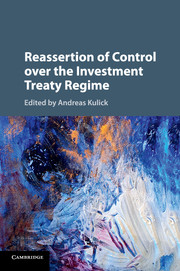Book contents
- Frontmatter
- Contents
- List of Contributors
- Preface
- PART I Introduction, Theory and Domestic Law Approaches
- PART II Procedural Aspects and Avenues of Reassertion
- 4 Early Dismissal of Claims in Investment Arbitration
- 5 Keeping the Status Quo or Embarking on a New Course? Setting Aside, Refusal of Enforcement, Annulment and Appeal
- 6 State-State Investment Arbitration as a Means of Reassertion of Control: From Antagonism to Dialogue
- PART III Substantive Aspects and Avenues of Reassertion
- PART IV Reassertion of Control: Policy and Trends
- Index
5 - Keeping the Status Quo or Embarking on a New Course? Setting Aside, Refusal of Enforcement, Annulment and Appeal
from PART II - Procedural Aspects and Avenues of Reassertion
Published online by Cambridge University Press: 12 January 2017
- Frontmatter
- Contents
- List of Contributors
- Preface
- PART I Introduction, Theory and Domestic Law Approaches
- PART II Procedural Aspects and Avenues of Reassertion
- 4 Early Dismissal of Claims in Investment Arbitration
- 5 Keeping the Status Quo or Embarking on a New Course? Setting Aside, Refusal of Enforcement, Annulment and Appeal
- 6 State-State Investment Arbitration as a Means of Reassertion of Control: From Antagonism to Dialogue
- PART III Substantive Aspects and Avenues of Reassertion
- PART IV Reassertion of Control: Policy and Trends
- Index
Summary
A. Introduction
In 2014, the European Commission engaged in a public consultation over the Transatlantic Trade and Investment Partnership (TTIP), which is being negotiated between the European Union and the United States. Some of the strongest concerns regarding foreign investment protection which became evident related to the proposed system of investor-State dispute settlement (ISDS). These concerns are not isolated: other States and stakeholders have raised similar objections against the ISDS mechanisms incorporated in over 3,000 international investment agreements (IIAs). Some States have withdrawn from procedural ISDS treaties, such as the Convention on the Settlement of Investment Disputes between States and Nationals of Other States (ICSID Convention), and renegotiated or terminated their substantive IIAs. Most fears seem to relate to the arbitral process (bringing claims, running proceedings and adjudicating cases), but one worry deals with ‘an old sore’ in international dispute settlement: the lack of appellate mechanisms which would allow for a fresh and independent look at allegedly wrongly decided cases.
In turn, the call for an appeal mechanism is located within a broader debate concerning finality and judicial review of international adjudicatory decisions in many subfields of international law. While virtually all domestic legal systems anticipate the possibility that a first-instance judge ‘got it wrong’, international courts and tribunals may seem to aspire to decisional infallibility. The situation is not so clear-cut, however, as there are ways open to States seeking to resist unpalatable awards. These are seeking to have the award set aside, opposing enforcement, and, in the case of ICSID awards, applying for annulment. This chapter addresses each of these status quo mechanisms in turn before analysing the establishment of a new appellate mechanism.
A final preliminary remark: ‘reassertion of control’ could be seen as a misnomer in the context of these various ways to review arbitral awards. States can (and should) exercise control over the international obligations they undertake as well as the dispute settlement mechanisms to which they subject themselves. This ex ante control takes place during the drafting stage of a treaty as well as through constitutionally required approval processes. However, it seems much less appropriate for a State which (through a process to which it consented) has been alleged or duly found to be in breach of its international obligations to produce a ‘get out of jail free’ card post factum as a means of ‘reasserting control’.
- Type
- Chapter
- Information
- Reassertion of Control over the Investment Treaty Regime , pp. 103 - 127Publisher: Cambridge University PressPrint publication year: 2016



